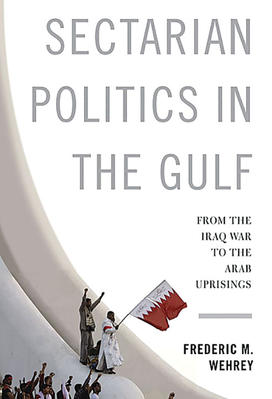Even while the bloody civil war in Syria threatens to engulf parts of Lebanon and Iraq, Federic M. Wehrey *02, a senior associate in the Middle East Program at the Carnegie Endowment for International Peace, believes that sectarianism is a poor lens through which to view the region’s tensions.
“It’s tempting to try to understand the region’s complexity by shorthand: Islam and the West; Israel and Palestine; Sunni and Shia. But focusing exclusively on the Shiite-Sunni split to understand current conflicts conflates symptoms with root causes,” Wehrey says.

In Sectarian Politics in the Gulf: From the Iraq War to the Arab Uprisings (Columbia University Press), Wehrey focuses on three Persian Gulf states — Bahrain, Saudia Arabia, and Kuwait — to argue that Sunni-Shia conflict is neither primordial nor inevitable. Instead, Wehrey believes that populations in the Gulf fall back on sectarian identities when poor national governance leaves them feeling insecure or excluded. Sectarianism, he writes, is largely “the result of the legitimacy deficit of Gulf rulers, feeble participatory institutions, uneven access to political and economic capital. ... [and] the dangerous policy of Gulf regimes to stoke sectarianism to prevent the emergence of broad-based opposition movements.”
Saudi Arabia and Kuwait have sizable Shia minorities, and Bahrain is predominantly Shia. But all three countries are ruled by autocratic Sunni regimes. According to Wehrey, these Sunni regimes have been gripped with paranoia since the Shia-led Iranian revolution in 1979 that there is a regional, Tehran-directed Shia conspiracy to topple them. To solidify their power, he argues, they have largely excluded Shia from the political process and, in times of unrest, blamed organized dissent or protests on Shia sedition.
Wehrey’s research (originally for an Oxford University dissertation) took him through the Gulf frequently during the Arab Spring. “To begin with, the protests were nonsectarian. But the regimes in each country cast the conflict as sectarian, and stirred up Sunni and Shia distrust,” he says.
To Wehrey, divide-and-rule is a dangerous gambit for the Sunni regimes — especially as social media shortens the fuse between discontent and open conflict on the Arab street. Nonetheless, Wehrey doubts that Syria’s civil war will spread to the Gulf, where, he says, the Shia are not revolutionaries and still are committed to reforming from within the political system.
Wehrey warns, however, that sectarian tensions have created a toxic political environment in the three countries he writes about. “Gulf leaders are tempting fate,” he says. “Instead of a Faustian bargain of using sectarianism for political gain, they should work toward genuine inclusion.”
Several Short Sentences About Writing by Verlyn Klinkenborg *82: “A lyrical plea for crisp, clear writing, this book is both practical and highly entertaining.”













No responses yet